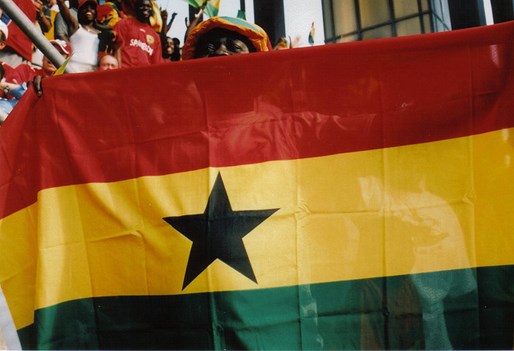Ghana’s secret: star players and cheats

“There is massive corruption in football and all hands must be on deck to eradicate that cankerworm” writes Thomas. Photo (c) flickr user Impact Tarmac and licensed under a Creative Commons 2.0 licence.
20.10.2010
By Olukayode ThomasThe people of Senya Bereku, a fishing community in the Central Region of Ghana, for example, had high expectations about the 2010 World Cup - not because they expected the Black Stars to win, but because of the promise by Michael Essien to build a hospital and a school for them afterwards.
“Michael is our son,” said Emmanuel Frimpong, a taxi driver who says he grew up with Essien. “He grew up and started playing football here before he moved away. We all support him and Chelsea here and we are waiting for him to come and fulfill his promise.” Were it not for football, Essien would probably have ended up a Senya Bereku fisherman, artisan or perhaps a teacher at the local school.
Antony Yeboah, after excelling in the English League and German Bundesliga, where he made fame and fortune, is now an employer in Ghana, owning hotels in Accra and Kumasi. And former Bayern Munich star, Samuel Osei Kuffuor, is a power player in the Ghanaian real estate industry today, owning sprawling estates in the same two cities. The eye catching ‘VAT House’, in the heart of Accra, is his. The former player employs many Ghanaians, and scores of youths have benefited from his scholarship scheme.
Life is less rosy for players who haven’t made it to the international scene. Kwadwo Poku of Asante Kotoko, one of the league’s best players, earns US $450 a month. Another top player, Eric Bekoe, earns only US $170. Some clubs pay players a maximum of US $ 70 a month, with some players reportedly earning as low as US $ 30.
It is the gap between international and local players that may have led to widespread corruption in the domestic league. Abedi ‘Pele’ Ayew, who was African Footballer of the Year for two consecutive seasons in 1991 and 1992 when he played for French club Olympique Marseille, was accused of match-fixing after the final round of matches for qualification for the country’s top league in 2007. The clubs involved were allegedly his own Nania Football Club and three other clubs: Okwahu United, Great Mariners FC and Tudu Mighty Jets. Ayew was found guilty and fined US $20,000. He was also banned from football for one season. The ban was later lifted and the fine reduced to US $5,000.
Even international player Stephen Apiah, who played in the just ended World Cup, was found guilty and fined for match fixing in 2004. Apiah admitted to receiving payment, and distributing the money to other players, at the Olympics in Greece in 2004. Something similar again happened in 2006, when the national Black Stars reportedly threw away their game against Brazil in the then World Cup. Soccer corruption investigator Declan Hill says in his book The Fix – Soccer and Organised Crime that he, Hill, was personally told, accurately, the score of the Brazil Ghana game, two days before the match was played.
Ghana’s match-fixing allegations date back to 1997, when investigators found that the team was in cahoots with Asian gamblers for this purpose. Declan Hill maintains that the gambling rings’ contact person was Abukari Damba, who had been a national player and coach of the Ghana Under 17-team. According to Hill, Damba had access to players at any level.
Football officials have been accused of involvement in the match-fixing, as well as of fiddling with the division levels. The head of the local Purejoy Stars FC, Isaac Tetteh, publicly blamed the relegation of his club to a lower division on corrupt practices by opposing club officials:
“I challenge you (the media, ed.) to dig deep and expose corruption affecting Ghana’s football. There is massive corruption in football and all hands must be on deck to eradicate that cankerworm. My humble plea is to the President, Minister of Youth and Sports, GFA President and the National Sports Council to come together to fight corruption in Ghanaian football, else we will fail as a nation,” Tetteh said.
His allegations were supported by Welbeck Abra-Appiah, the chairman of the Premier League Board. Abra-Appiah said that virtually all clubs were engaged in ‘corrupt acts’.
Nevertheless, unlike other African countries in the investigation, Ghana seems to have a successful soccer development programme. The Ghanaian Football Association, one of the oldest on the continent, spends its money on youth development, which has seen its junior teams winning international tournaments at World Cup level.
And, though it was the lowest ranked African country at the 2010 World Cup – apart from South Africa which qualified by virtue of being the host – Ghana qualified for the quarter finals in only its second qualification for the tournament. Its team was the right mix, experts say: it had international players as well as as many as six young local players, all hungry for success. The average age for team members was 24 years.
These results seem to indicate that engaging in a bit of fixing seems to have done Ghana’s general soccer development no harm, at least not so far. The question could be asked whether match-fixing is perhaps a ‘higher’ level of corruption than simply having soccer officials living the good life from soccer money, like the situations uncovered in FAIR’s other country investigations. But while match fixing might not be affecting the country at the moment, it can kill soccer in the long run, as it has done in Asia.
This article was first published in the report "Killing Soccer in Africa" from the Forum for African Investigative Reporters (FAIR), but has been republished on Play the Game's website with kind permission from the author.
Read more about the report here





